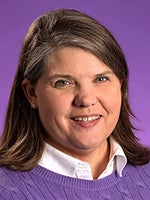MSOE Adjunct Faculty

Dr. Elizabeth Hodge serves as Adjunct Faculty in the Miller School of Entrepreneurship. She joined the faculty at East Carolina University in 2000. As a longtime advocate of distance education and the use of innovative technology tools to transform learning, her research includes immersive education, e-learning, mobile learning, 3D multi-user virtual environments, professional learning communities and innovative instructional methods. Dr. Hodge is the co-author of the Secondary ISLES eBooks, The Virtual Worlds Handbook and numerous book chapters and journal articles. She has presented extensively at the state, national, and international levels. During her sixteen years at ECU she has been involved in several grants and projects some of which include SMS Text Messaging Initiative, Green Screen (Chroma key) technology media lab, Crystal Island Lost Investigation intelligent game-based learning environments for literacy education grant, Video Grand Rounds, edTPA and the 360° Video Student Immersion Program.

Dr. Sharon Paynter serves as Adjunct Faculty in the Miller School of Entrepreneurship. She is the Assistant Vice Chancellor for Community Engagement at East Carolina University and Associate Professor of Political Science. She joined East Carolina University in 2009 after completing a postdoctoral fellowship in Public Policy at Brown University. She earned a Ph.D. In Public Administration from North Carolina State University (2008), Master of Legal Administration from the University of Denver (2004), and Master of Public Administration (2003) and Bachelor of Science in Biology (1994) from the University of North Carolina at Chapel Hill. Her research has been published in journals including the Journal of Community Engagement and Scholarship, State and Local Government Review, and Policy Studies Journal. Sharon is a member of the Executive Committees for the Engagement Scholarship Consortium and the APLU Commission on Economic and Community Engagement.

Dr. Carlyle Rogers serves as Adjunct Faculty in the Miller School of Entrepreneurship. As a native of Eastern North Carolina, Dr. Rogers knows that the seed of innovation when given the right care can transform the region’s economy and identity into an engine of economic prosperity. He currently serves as Interim Executive Director for the Office of Innovation and New Ventures and works diligently to facilitate the development and to increase the visibility of inventions, innovations and startups coming out of ECU.With a PhD in Pharmacology and Toxicology from the Brody School of Medicine at ECU (2013), Dr. Rogers, is a former recipient of the prestigious Howard Bremer Scholarship from the Association of University Technology Managers and in collaboration with the ECU Graduate School established the first Three Minute Thesis event at ECU. Since 2013, Dr. Rogers has performed over 300 innovation assessments, executed over 250 agreements and assisted faculty in receiving over $800,000 in funding related to commercialization and innovation. In addition to his licensing experience, Dr. Rogers develops web based applications, including Tandem Talk, a web-based tool that delivers exogenous vowel/sounds combinations to the user and reduces or eliminates the effect of silent block and TDAC, a series of electronic check-lists designed to assist inventors and entrepreneurs in assessing their technology.

Mr. Wayne Godwin serves as Adjunct Faculty in the Miller School of Entrepreneurship. Specializing in 3D modeling and animation, Wayne has over 35 years’ experience teaching design at various levels at the University and in K-12. In addition to working in art and design, he also teaches the Freshman Seminars in the Honors College, connecting students to the needs of the region. He now serves as the Director of the ECU Innovation Design Lab (IDL), a technology-based environment that uses design to connect academics and industries for new products, processes and policies. He works with industry to develop traditional and advanced learning technology programs that teach innovation and design thinking.